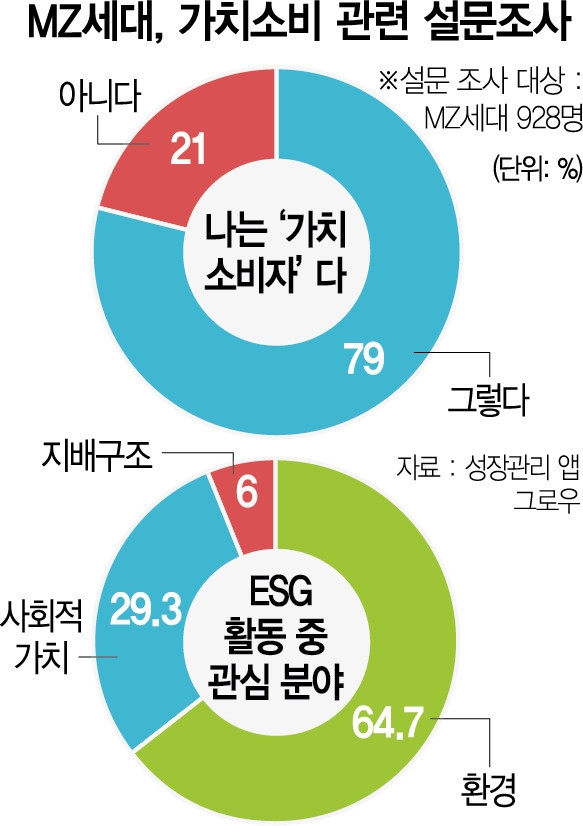 |
In fact, even before ESG management emerged, CSR and Stewardship Codes existed as words that emphasized corporate social roles and responsibilities. First, Corporate Social Responsibility (CSR) is a term that refers to a management technique that bears legal and moral responsibility to direct or indirect stakeholders who influence corporate activities. For example, Coca-Cola and McDonald's, which sell high-calorie and high-sugar junk food, dress up their corporate image socially, ethically and eco-friendly through global sporting events such as the Olympics and the World Cup. As such, CSR was often used as a means to mask shortcomings because the company’s image was selectively conducted as needed. Stewardship Code refers to autonomous guidelines to actively induce institutional investors in exercising their voting rights. The National Pension Service introduced a Stewardship Code in 2018 to enhance shareholder value in investment companies and prevent major shareholders from being transferred so as to attract transparent management by actively participating in decisionmaking. Just like CSR and the Stewardship Code in the past, there may be concerns that ESG may become a concept that is popular for a short time and then disappears. In conclusion, ESG management is no longer an option for a company, but an essential component of survival. So, what is the essential difference between traditional companies and those using ESG management?
Why run ESG Management?
In the past, the company was focused on the perspective of shareholder capitalism for shareholder profits. Companies are now following another trend, as both investors and consumers have begun investing in good companies. In the past, companies were judged primarily only on financial performance such as internal equity ratio and debt ratio. But now, nonfinancial longterm performances such as ESG, which affects corporate value and sustainability, is also becoming important. Furthermore, companies with good environmental, social, and governance scores also showed good management performance. This confirms that ESG has a positive impact on financial performance. Companies with high ESG management level have lower investment risk, higher profitability, and better corporate valuation. In other words, if companies do not practice ESG management, their social reputation will deteriorate from what it was in the past, when the impact was minimal. Now, ESG management levels will become a decisive criterion for companies’ actual performance and investment. Consumers are also increasingly having more and more needs for raised social values. They prefer products from companies that actively show social responsibility even if the price is slightly higher than lowcost products from companies that neglect their social responsibility. According to a 2021 Korea Chamber of Commerce and Industry survey, more than 60 percent of consumers said they considered ESG activities when purchasing products, and nearly 70 percent said they had experience of intentionally avoiding purchasing products from companies that were negative about ESG activities. As evidenced by this statistics, there are many cases in which consumers' actually expressed their views about ESG management.
 |
Since its inception, Patagonia has made significant efforts to build an image of a prosocial/environmental enterprise in order to appeal to the younger generation, its primary customer base. Efforts were made to manage ESG by utilizing ecofriendly recycled materials, donating 1% of sales to address climate change, and implementing ecofriendly policies in the supply chain. In conclusion, Patagonia's sales surged as consumers increased Patagonia’s consumption levels despite having higher price than its competitors. Conversely, companies that fail in terms of ESG despite there being no problems with the products, are sometimes subject to consumer boycotts. In 2020, a heavily funded blockbuster film "Mulan" was filmed in the Uighur region of Xinjiang, China, which is criticized for human rights abuses, and the producers of the film sent a thankyou message to Chinese police which triggered a boycott by consumers. In the end, the company lost a lot at the box office due to these issues, and Disney declared an aggressive response to ESG. These examples clearly confirm the importance of ESG management.
Examples of ESG Management
 |
Carrot Market, launched in 2015, is Korea's No. 1 regionalbased online used goods transaction platform, and has already achieved 20 million subscribers and 15 million monthly users. Now, when people want to buy and sell used goods, when they read or post local ads, when they want to get information about their neighborhoods, many people think of Carrot Markets, a localbased community. Currently, Korea is overflowing with wasted resources, and the most representative example is clothing. In the fashion world, fast fashion, which means clothes that are quickly produced and distributed by immediately reflecting the latest trends, has already become a trend. Thanks to fast fashion, people can try on a variety of clothes to their heart's content, but it has resulted in overproduction of clothes. In addition, clothes that are printed so quickly are often of too poor quality to be worn for a long time, and they are easily discarded because they reflect the latest trends at a certain time. According to environmental protection group Greenpeace, 92 million tons of textiles are discarded as waste every year. It's like a garbage truck full of clothes are thrown away every second. Carrot Markets are said to have hosted more than 100 million tranactions last year alone, which is said to have a similar effect to planting more than 27.7 million trees. Carrot Market not only creates environmental value through reuse of used goods, but also strives to protect the environment through consultations between companies. In convenience stores, expired foods are always disposed of, and the amount of discarded products is said to be large. According to a store owner who runs a convenience store in Dongdaemungu, Seoul, the average amount of waste loss incurred in convenience stores is around 500,000 won per month. Carrot Market, along with GS Retail, will soon introduce a service that informs Carrot Market users of expiring products at local convenience stores and supermarkets. This is expected to reduce waste, make efficient use of food resources, and maximize profits for franchisees. Carrot Markets have a positive social impact. Many small business owners have been experiencing economic difficulties since COVID19. Carrot Market is a useful promotional platform for small business owners with such concerns. If you use the Carrot Market application, you can actually check the advertisement in the middle. Small business owners can easily have their ads shown to local residents who will become their main customers at a lower price than other platforms (Instagram, Facebook, etc.). Also, a campaign was held at the Carrot Market on November 5 to celebrate Small Business Day, the legal anniversary. If you choose a local store that you only knew and send warm support, you can receive gifts prepared by small business owners through a lottery. This became an effective means of promoting good store owners and good stores, and at the same time, it became a campaign that delivered warm support to small business owners suffering fromCOVID19. The carrot market is an icon of innovation in the IT industry, creating a new business model based on the value of resource reuse and interconnection.
 |
Pulmuone is a Korean food manufacturing company that pursues social environmental value through plantbased food. In recognition of these efforts, the company won the grand prize at the "Korea ESG Management Awards selected by the media" in 2022. Pulmuone has expanded the production of climate change mitigation products such as plant food and animal welfare food, and is protecting the environment through activities to reduce greenhouse gases and minimize packaging. In addition, since 2012, the Pulmuone Foundation, a nonprofit public interest corporation, has been established and has been engaged in social activities in three areas: healthy food, healthy environment, and healthy society. Examples include "Right Food Education for People's Proper Eating," "Virus and Global Environment Class," which publishes the causes and prevention of virus infections from a scientific point of view and environmental perspective, and "Children's Picking," a nonfacetoface environmental protection project where children and parents jog together to pick up trash and certify on their phones. In addition, in order to help workers with developmental disabilities achieve selfsufficiency and establish a foundation for selfreliance, Pulmuone has signed an MOU with Ganghwado Woori Village in 2011 to support the production, distribution, and sale of ecofriendly bean sprouts. In addition, Pulmuone began to expand the transparency so that it has a globallevel governance structure even before ESG gained attention. In 2018, Pulmuone began to create a sound and transparent governance structure through the formation of a board of directors that has a professional management system with enhanced expertise.
The substance of ESG management
 |
In contrast to these advantages, there are growing concerns that companies might only use ESG as a means of promotion or marketing. Green washing is a combination of green, which symbolizes ecofriendliness, and washing, which means camouflage to look ecofriendly, which harms the environment because it only promotes a company as being ecofriendly. Starbucks Korea, which was recently criticized for greenwashing in a parliamentary audit, is considered a case in point. Starbucks is often known as the best event management company in Korea. In the meantime, customers have headed to Starbucks to buy numerous Starbucks items, proving that the strategy was successful. In 2012, a design team was established within Starbucks Korea to develop and sell limited edition MD products exclusively for environmental protection, and MD sales increased by 20% each year. However, more greenhouse gases are generated during the production and disposal of tumblers than paper and plastic cups. The U.S. Life Cycle Analysis Research Institute says that tumblers need to be used more than 15 times for glass tumblers, 17 times for plastic tumblers, 39 times for ceramic tumblers, and as many as 1,000 times for stainless tumblers to achieve environmental protection. In addition, if you visit the store and order a drink, there was a controversial event called "Reusable Cup Day" that provides drinks in multiuse cups with a special design for the 50th anniversary of global Starbucks. It is no exaggeration to say that Starbucks Korea, which sells plastic cups that are not biodegradable, under the title of "environmental protection," has made us doubt the authenticity of its previous ecofriendly action. In addition, Starbucks 'Partners' (the name of the store staff) has also had excessive work problems. Employees who had to face the complaints of consumers who were driven to the store due to the "Reusable Cup Day" event expressed great dissatisfaction. Some stores had 650 waiting drinks, so employees were too busy to breathe. This excessive burden of work has been a problem at every monthly marketing event, and complaints have accumulated for a long time, and truck demonstrations were held against the headquarters in October 2021. Starbucks Korea later announced that it plans to establish a "human resources securing team" that oversees recruitment at its in-house notice to reduce the workload of partners working during busy hours by expanding flexibility in their work patterns.
Companies are mostly focused on the environment and society, and there is often little mention of governance. However, in order for domestic companies to be recognized as global companies, they must respond well to governance indicators. When I looked at the best ESG practices, few companies achieved satisfactory results with all three, and most were focused on the environment or society. In fact, according to data released in 2021 by the Korea Chamber of Commerce and Industry, 41.3% of the areas where companies were responding most poorly in ESG management were governance. Therefore, some point out that it is a 'flaggy ESG' that focuses on the environment is easy to apply and accessible to product development. Experts note that the history of interest in governance (G) is relatively short compared to global companies as corporate management is centered on lowcarbon society and heads of companies. The separation of board chairman and CEO is a prime example of large companies' governance structure. It was only two years ago that SK Group's holding company separated the chairman and CEO, and LG Group's holding company also separated the chairman and CEO by the end of 2021. In addition last year, SK Group established a governance committee led by outside directors, but has yet to come up with any significant improvement measures, and the rest of the companies, except for these two companies, have failed to respond to the governance structure. New governance indexes such as the board's female director ratio, CEO wage calculation method, lobbying funds, antibribery measures, and risk management are added every year, but this is considered a back burner item. The reality is that out of 47 board members of major companies (Samsung Electronics, Hyundai Motor, SK, LG, and Lotte), only two directors are female, and they do not know about corporate money laundering and lobbying.
Future Prospects and Direction of ESG Management
ESG management must be moving forward regardless of the industrial sector. But there are definitely areas that need to be improved as there is interest in the rapidly emerging ESG. First of all, the current ESG evaluation lacks enough information to evaluate because the areas covered by ESG are very wide and diverse. For this reason, there may be significant variations in each evaluation institution, and due to the limitations of ESG evaluation, the reliability is not high and the consistency is very low. Different companies have different contents, items, and formats, making it difficult to compare companies so these evaluations are not useful. According to a survey by Leaders Index of the Institute for Corporate Analysis, 334 companies that submit quarterly reports among the top 500 companies in Korea, 97 or 29% of them have ESG committees, and 69 of them have ESG chairmen, which is only 20.6%. In order to avoid becoming a vain ESG management, a unified evaluation system and monitoring measures for continuity must be made. Previously, companies said they were not keeping their governance items, but there has been news among large companies that are reorganizing their governance structure. For example, SK Group is considering a scenario of making SK Hynix a subsidiary of SK through personnel division. Governance is a less publicized area than the environmental and social areas, and we also need to pay attention and ask companies for transparency.
"Do you consume ideologically?" was said by person in management of a large distribution company more than 10 years ago. There was some controversy, but in fact, this question was not so wrong at the time. This is because it was the general idea at the time that consumption was for one's own benefit, so social and political values had no place for intervention in consumer choices. It's different now. The role of consumers is more important than anything else in order for more companies to enrich the world with ESG as a growth axis. From the perspective of companies, consumers who are willing to give up profits for value and belief will be frightening. This is because companies demand top products, services, and more. Just as voters cast their precious votes, why don't we just choose products and services from companies that are thoroughly serious about EGS every time we buy something? The world will be a little warmer than it is now when people have evolved to "value consuming human" beyond "consumering human.'
이가윤 gabriela12@naver.com
<저작권자 © 인하프레스, 무단 전재 및 재배포 금지>

![[보도] 제43대 총학생회 후보자 공청회 개최돼](/news/photo/202404/11686_5015_2626.png) [보도] 제43대 총학생회 후보자 공청회 개최돼
[보도] 제43대 총학생회 후보자 공청회 개최돼
![[보도] 제43대 총학생회 후보자 공청회 개최돼](/news/thumbnail/202404/11686_5015_2626_v150.jpg)
![[보도] 총학생회장 선거 열려···학생사회 대표자는?](/news/thumbnail/202403/11668_5014_266_v150.jpg)
![[보도] 무전공·계열제 논의···학생은 어디에?](/news/thumbnail/202403/11666_5011_2238_v150.jpg)
![[보도] 인하 70돌, 다양한 행사 이어져](/news/thumbnail/202403/11663_5009_165_v150.jpg)
